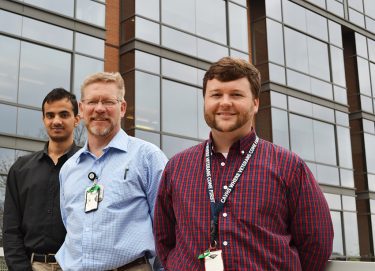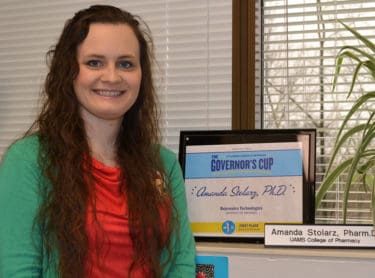College of Pharmacy Ph.D. Program, Dual Degrees Offer Fulfillment
| Choosing a career is sometimes difficult if a student has more than one interest. However, if a student has a passion for both pharmacy and research, pursuing concurrent Pharm.D., and Ph.D. degrees can unite those interests and double them.
Amanda Stolarz, Pharm.D., Ph.D., came to that realization early in her study to earn a doctorate in pharmacy.
“I always wanted to do research, translational research, so I went to pharmacy school to get the clinical perspective,” Stolarz said. “Within that first year, I realized for the kind of research I wanted to do I needed to get the Ph.D. to do the basic science. With both, I felt I could take basic science and give it a clinical aspect that would propel it into clinical application in the future.”
Now, she is an assistant professor in the Department of Pharmaceutical Sciences in the UAMS College of Pharmacy, and chief science officer for Rejuvenix Technologies, a startup exploring the commercial potential of liposomes.
Students like Stolarz can do four years in the College of Pharmacy, and then study for two more years to finish up with a Ph.D., said Antino Allen, Ph.D., associate professor in the college’s Division of Radiation Health in the Department of Pharmaceutical Sciences
Stolarz said that was possible in part because some of her pharmacy credits counted toward the Ph.D. and vice versa.
Allen leads students through one of the two tracks toward getting a Ph.D. in Pharmaceutical Sciences, one that is more laboratory based and focused on future careers in basic research or in private industry.
Bradley Martin, Pharm.D., Ph.D., oversees the other track in Pharmaceutical Evaluation & Policy (PEP).

Bradley Martin, center, Pharm.D., Ph.D., is the senior author of a new study on opioid use published recently by the Centers for Disease Control and Prevention. Anuj Shah, left, and Corey Hayes, Pharm.D., right, co-authored the study with Martin. (2017 file photo)
Students in the PEP Ph.D. track train in subject areas such as economics of pharmacy and pharmaceuticals, health technology assessment, cost effectives and bioinformatics.
One of Stolarz’s classmates, Corey Hayes, Pharm.D., class of 2013, chose that direction for his Ph.D, but unlike Stolarz he made that decision after working for three years in clinical pharmacy in a hospital.
“I loved and enjoyed research and answering new questions. I just missed it and wanted to get back into it,” Hayes said.
At first, he continued to work and studied part time, but within a year, he had decided to commit to his course of study full time and graduated with his Ph.D. in 2018.
“You can go the academic route like me or do the same thing through pharmaceutical industry routes,” Hayes said. “If someone has an interest in either of those things, this is a great way to go.”
In 2017, Hayes, Martin and then-fellow student Anuj Shah co-authored a study that concluded the single biggest factor determining whether a patient is likely to use opioids long term may be the number of days’ supply initially prescribed. The Journal of Pain, a scientific journal, published the study’s results. It garnered wide national media attention and led to new guidelines in several states for prescribing opioids.
Hayes is continuing his research into opioids using bioinformatics to analyze opioid dose escalation and discontinuation using large de-identified patient data sets.
Hayes and Stolarz are not alone in establishing themselves firmly on a career path after adding Ph.D. degrees to their Pharm.D.
“In my lab, I’ve had one student go into industry, two doing postdoctoral studies, and one doing science writing,” Allen said. “When we get a new student admitted, we sit down with them to determine what kind of career path they want to pursue, and then tailor their experience to achieve that.”

Amanda Stolarz earned both her Ph.D. and Pharm.D. in a course of study that allowed her to pursue both degrees concurrently.
Allen said when students enter their final year of doctoral study, he teaches them classes on CV development, how to search for a job in their field and how to interview.
Martin provides similar mentorship, and it has paid off for the students in his program.
“All of our students have had jobs, in the fields for which they were trained, on graduation,” Martin said. “None have lingered or had to pursue a postdoc. They’ve gotten positions in academics or as research scientists in pharmaceutical companies.”
Stolarz said when she finished her degrees, there were several universities looking for someone with her qualifications, and she feels she would have been competitive for those positions, however she chose to start her career at UAMS.
“I wanted to stay at UAMS because I liked it here,” Stolarz said. “I have family in Arkansas, and the College of Pharmacy felt like family. It was a natural fit for me to stay here. Having the two doctorates does increase your versatility and mobility though.”
